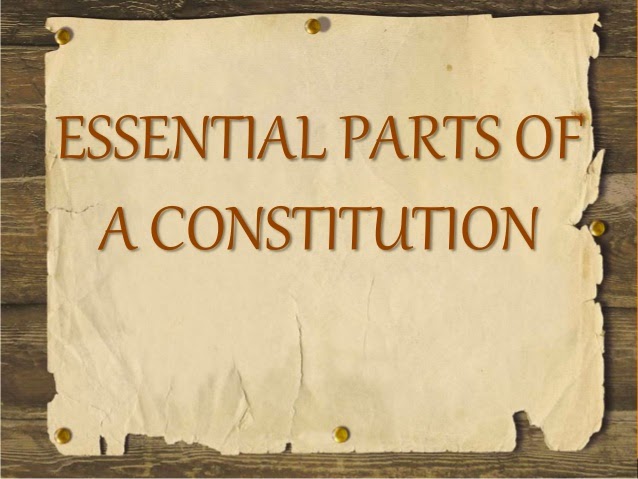Part
|
Subject Matter
|
Articles
|
I
|
The Union and its territory
|
1 to 4
|
II
|
Citizenship
|
5 to 11
|
III
|
Fundamental Rights
|
12 to 35
|
IV
|
Directive Principles of State Policy
|
36 to 51
|
IV-A
|
Fundamental Duties
|
51-A
|
V
|
The Union Government
|
52 to 151
|
Chapter I – The Executive
|
52 to 78
|
|
Chapter II – Parliament
|
79 to 122
|
|
Chapter III – Legislative Powers of President
|
123
|
|
Chapter IV – The Union Judiciary
|
124 to 147
|
|
Chapter V – Comptroller and Auditor-General of India
|
148 to 151
|
|
VI
|
The State Governments
|
152 to 237
|
Chapter I – General 152
|
||
Chapter II – The Executive
|
153 to 167
|
|
Chapter III – The State Legislature
|
168 to 212
|
|
Chapter IV – Legislative Powers of Governor
|
213
|
|
Chapter V – The High Courts
|
214 to 232
|
|
Chapter VI – Subordinate Courts
|
233 to 237
|
|
VIII
|
The Union Territories
|
239 to 242
|
IX
|
The Panchayats
|
243 to 243-0
|
IX-A
|
The Municipalities
|
243-P to 243-ZG
|
IX-B
|
The Co-operative Societies
|
243-ZH to 243-ZT
|
X
|
The Scheduled and Tribal Areas
|
244 to 244-A
|
XI
|
Relations between the Union and the States
|
245 to 263
|
Chapter I – Legislative Relations
|
245 to 255
|
|
Chapter II – Administrative Relations
|
256 to 263
|
|
XII
|
Finance, Property, Contracts and Suits
|
264 to 300-A
|
Chapter I – Finance
|
264 to 291
|
|
Chapter II – Borrowing
|
292 to 293
|
|
Chapter III – Property, Contracts, Rights,
Liabilities, Obligations and Suits
|
294 to 300
|
|
Chapter IV – Right to Property
|
300-A
|
|
XIII
|
Trade, Commerce and Intercourse within the
Territory of India
|
301 to 307
|
XIV
|
Services under the Union and the States
|
308 to 323
|
Chapter I – Services
|
308 to 314
|
|
Chapter II – Public Service Commissions
|
315 to 323
|
|
XIV-A
|
Tribunals
|
323-A to 323-B
|
XV
|
Elections
|
324 to 329-A
|
XVI
|
Special Provisions relating to Certain Classes
|
330 to 342
|
XVII
|
Official Language
|
343 to 351
|
Chapter I – Language of the Union
|
343 to 344
|
|
Chapter II – Regional Languages
|
345 to 347
|
|
Chapter III—Language of the Supreme Court, High
Courts, and so on
|
348 to 349
|
|
Chapter IV—Special Directives
|
350 to 351
|
|
XVIII
|
Emergency Provisions
|
352 to 360
|
XIX
|
Miscellaneous
|
361 to 367
|
XX
|
Amendment of the Constitution
|
368
|
XXI
|
Temporary, Transitional and Special Provisions
|
369 to 392
|
XXII
|
Short title, Commencement, Authoritative Text in
Hindi and Repeals
|
393 to 395
|
7th Amendment Act (1956) - Part VII was deleated
42nd Amendment Act (1976) - Part IV-A and Part XIV-A were added
74th Amendment Act (1992) - Part IX-A was added
97th Amendment Act (2011) - Part IX-B was added

Comments
Post a Comment